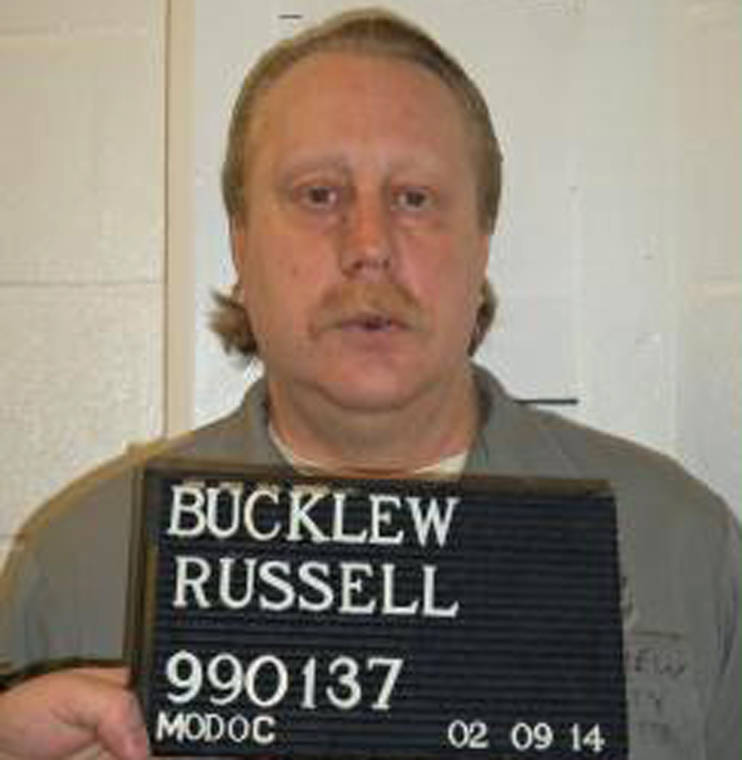ST. LOUIS — A Missouri man was executed Tuesday for killing a man during a violent 1996 crime spree, despite concerns that the inmate’s rare medical condition would cause a gruesome lethal injection.
Russell Bucklew was executed at the state prison in Bonne Terre. It was Missouri’s first execution since January 2017.
Bucklew had twice previously been within hours of execution, only to have the U.S. Supreme Court grant last-minute reprieves over concerns that he might suffer during the execution process. He had a condition called cavernous hemangioma and had blood-filled tumors in his head, neck and throat. He breathed with help from a tracheostomy tube.
Bucklew’s attorneys said in a clemency request to Gov. Mike Parson that a throat tumor could burst, causing Bucklew to choke and die painfully and in violation of the constitutional guarantee against cruel and unusual punishment.
Bucklew looked around and twitched his feet beneath the sheet as he lay on the gurney just before the lethal injection. He suddenly took a deep breath and all movement stopped.
There were no outward signs of distress.
Adding to the concern was Missouri’s secretive execution drug. The state uses a single dose of pentobarbital but refuses to say where it gets it. The source is believed to be a compound pharmacy since large pharmaceutical companies prohibit the use of their drugs in executions.
The Supreme Court stepped in to halt Bucklew’s execution in 2014 and again in 2018. But in April, the high court gave the go-ahead for Bucklew to be executed.
Human rights groups and death penalty opponents, including all four Roman Catholic bishops in Missouri and the American Civil Liberties Union, urged Parson to grant clemency and remand Bucklew to life in prison without parole. The ACLU and Missourians for Alternatives to the Death Penalty presented the governor’s office on Thursday with petitions that they said included more than 57,000 signatures.
But Parson, a Republican who worked in law enforcement for more than 20 years and a staunch death penalty supporter, decided early Tuesday that the execution could proceed.
Inmates’ medical conditions have affected other recent execution attempts.
In 2017, the execution of twice-convicted killer Alva Campbell, who suffered from smoking-related breathing problems, had to be halted in Ohio when a usable vein couldn’t be found to administer execution drugs. He died in 2018 at age 69.
In 2018, Alabama halted the lethal injection of Doyle Lee Hamm when the execution team had trouble getting the intravenous line connected. Hamm had damaged veins because of lymphoma, hepatitis and drug use. A doctor hired by Hamm’s lawyers wrote in a report that Hamm had at least 11 puncture sites and bled heavily from his groin during the attempts to connect the line.
Bucklew’s girlfriend, Stephanie Ray, left him on Valentine’s Day 1996. Over the next few weeks, according to court records, he harassed her, cut her with a knife and punched her in the face.
Ray feared for her life and the lives of her children, so she moved into the Cape Girardeau County mobile home that her new boyfriend, Michael Sanders, shared with his children.
On March 21, after stealing his nephew’s car and taking two pistols, handcuffs and duct tape from his brother, Bucklew followed Ray to Sanders’ home. Sanders confronted Bucklew with a shotgun inside the home. Bucklew fired two shots, one piercing Sanders’ lung. He bled to death.
Bucklew then shot at Sanders’ 6-year-old son and missed. Court records say he struck Ray in the face with the pistol, handcuffed her and dragged her to his car. He later raped Ray before heading north on Interstate 55.
A trooper spotted Bucklew’s car and eventually became engaged in a gunfight near St. Louis. Both men were wounded. Bucklew later escaped from the Cape Girardeau County Jail. He attacked Ray’s mother and her boyfriend with a hammer before being recaptured.
Bucklew’s attorneys, Cheryl Pilate and Jeremy Weis, said in a statement that Bucklew was remorseful for his crimes.


